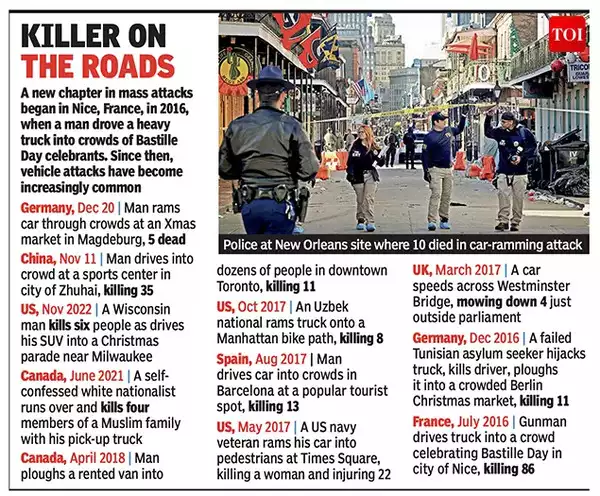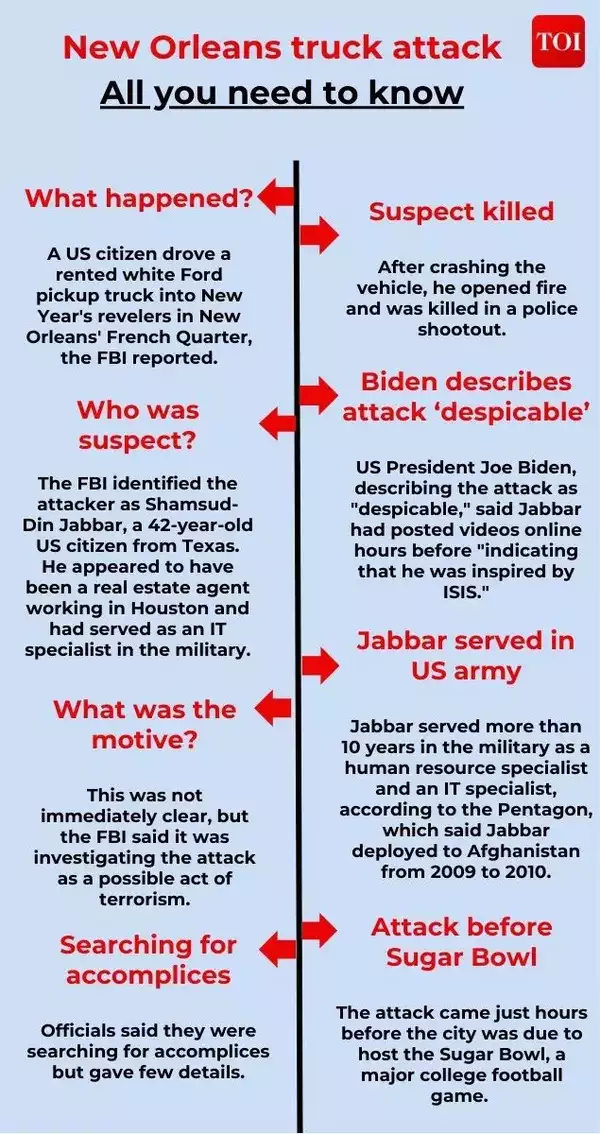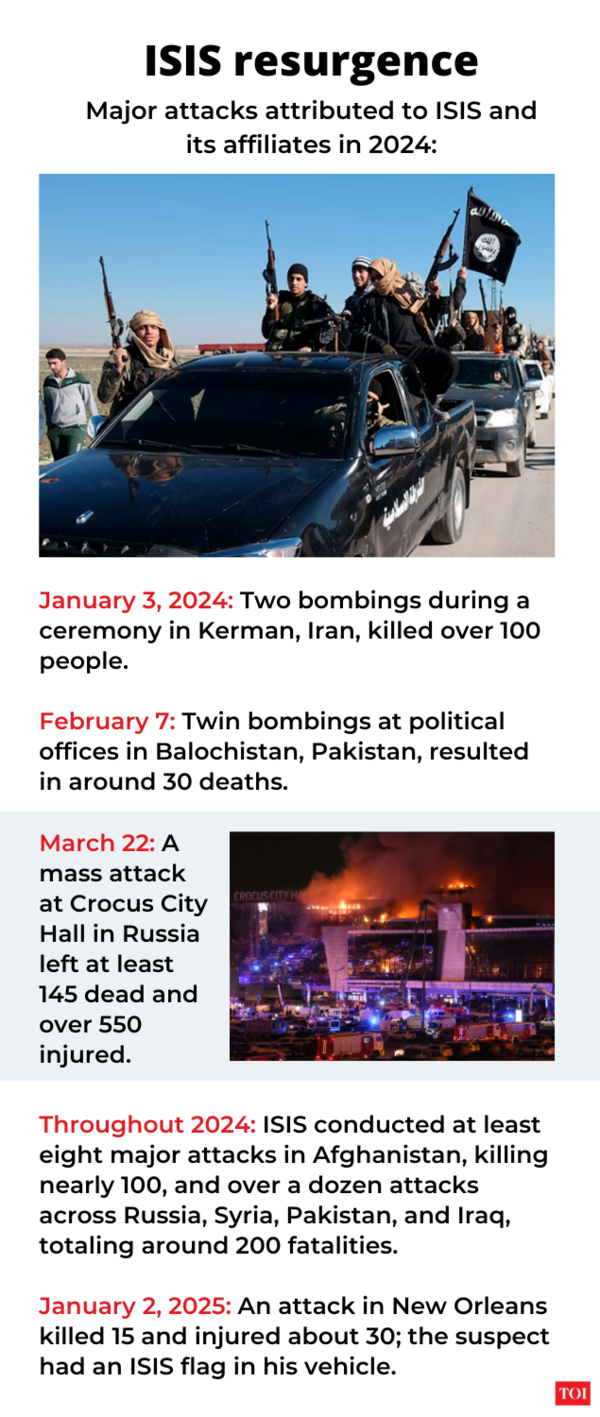Concerns about the Islamic State‘s ( IS ) global resurgence and its capacity to inspire or coordinate terrorist acts have been reawakened by two chilling attacks on New Year’s Eve in the US, one in New Orleans and the other in Las Vegas.
Driving the news: New Orleans
- A US military senior, Shamsud-Din Jabbar, drove a delivery vehicle into a group in New Orleans during New Year events, killing at least 15 people and injuring lots.
- Jabbar, a 42-year-old Texas native and former military IT expert, carried an Islamic State symbol in his car, and leaders described the attack as inspired by ISIS.
- Joe Biden, the leader of the US, criticized the assault as “despicable” and pointed out that Jabbar had posted video online hours before the event that showed his allegiance to ISIS.
- The invasion started near Bourbon Street in New Orleans ‘ European Quarter, a significant tourist destination, and ended with Jabbar being killed in a police battle, which left two officers injured.
- Authorities are searching for potential partners, believing Jabbar did not act alone. Two homemade weapons were discovered and neutralized at the scene.
- No identity has been established, but the FBI is is is issuing search warrants in New Orleans and other state and looking into possible connections to this invasion and a Las Vegas blast.
- Testimony described the scene as turbulent and horrible, with one calling it a “war area” due to the destruction and bloodshed.
- Jabbar had a military background, serving from 2007 to 2015, including a implementation to Afghanistan, and later in the Army Reserve until 2020.
- The Sugar Bowl was delayed by the event, which caused major disruption in New Orleans, and raised security issues ahead of the Super Bowl, which is scheduled to take place in the town next month.

Tesla Cybertruck detonates in the Trump Las Vegas resort
- On Wednesday, a Tesla Cybertruck exploded outside the Trump International Hotel in Las Vegas, injuring seven people and killing the motorist, causing the FBI to launch an investigation into potential terrorism.
- Videos captured by testimony showed the aircraft engulfed in flames outside the hotel, which is owned by the Trump Organization, linked to President-elect Donald Trump.
- The incident occurred days after a split attack in New Orleans, where a person drove a vehicle into New Year’s parties, killing 15, raising concerns about possible links.
- FBI special agent Jeremy Schwartz stressed the need for further research and that it was not yet clear whether the explosion was a criminal work.
- A Turo spokeswoman stated that neither homeowner had a recognized criminal background. The Cybertruck had been rented in Colorado through Turo, the exact car-sharing services used for the car in the New Orleans harm.
- Tesla’s CEO Elon Musk made it clear that the blast was related to the Cybertruck’s layout, pointing out that there were no faults with the vehicle’s telemetry, and that it was related to fireworks or a weapon in the truck bed.
- The Trump Hotel was vacated as a protection after the blast killed one man inside the car and injured seven people, two of whom were hospitalized.
- Deputy Kevin McMahill compared the high-profile characteristics of the location and the vehicle involved to the earlier incident in New Orleans.
- The FBI and Turo are working together to research both occurrences, while Las Vegas firefighters immediately extinguished the flames and protected the people.
Why it concerns
- These incidents highlight a caring trend: IS continues to have brand sex, despite having been defeated geographically in Iraq and Syria, and is the target of attacks all over the world.
- The New Orleans horror is the deadliest IS-inspired performance on American soil since the 2016 Pulse nightclub killing.
- If IS connections are confirmed, it may reflect the team’s disturbing ability to carry out—or inspire—coordinated problems far beyond the Middle East.
- Despite decades of investments in terrorism, the New Orleans and Las Vegas situations highlight weaknesses in US home safety.
- Shamsud-Din Jabbar, the suspect in the New Orleans attack, was an army veteran with no apparent red flags in his background. Yet he managed to plan and execute a deadly attack under law enforcement’s radar.
- The two incidents ‘ coordinated nature raises questions about IS’s operational abilities and suggests a potential failure to recognize pre-attack signals.

Zoom in
The two attacks come at a crucial political transition in the US, with Donald Trump expected to take office in less than three weeks. Trump has frequently criticized the FBI and the Department of Justice ( DOJ) for their “misplaced priorities,” pleading for more leadership to deal with both internal and external threats. In his remarks following the attacks, he urged immediate CIA cooperation to stop further deterioration of US security and democracy.
Our Country is a disaster, a laughing stock all over the World! This is what happens when you have OPEN BORDERS, with weak, ineffective, and virtually nonexistent leadership. State and local prosecutors from the DOJ, FBI, and Democrats have not carried out their duties. They are corrupt and incompetent, having spent all of their waking hours attacking their political rival, ME, rather than focusing on defending Americans from the outside and inside the violent SCUM that has enshrined all aspects of our government and our nation itself. Democrats should be ashamed for allowing this to happen in their own country. The CIA must get involved, NOW, before it is too late. The USA is breaking down- A violent erosion of Safety, National Security, and Democracy is taking place all across our Nation. Only strength and strong leadership can stop it. See you on January 20th. MAKE AMERICA GREAT AGAIN!
US President-elect Donald Trump
The attacks also highlight gaps in resource allocation and interagency cooperation. Since the Obama administration, the focus of US security has shifted to great-power competition with China and Russia, potentially detracting from counterterrorism efforts. Experts warn that this shift has made domestic agencies ineffective to identify and stop emerging threats from organizations like IS.
IS’s global resurgence
The Islamic State’s capacity to inspire violence, even as it lacks a physical caliphate, underscores its evolution into a decentralized network. IS once had a lot of territory and resources, but it now serves as an ideological and operational hub, connecting with sympathizers all over the world using social media and encrypted communication. Due to the increased frequency of attacks carried out by individuals or small cells acting with little oversight, this has made the organization harder to combat.
According to information from US Central Command ( CENTCOM), IS carried out 153 attacks across Iraq and Syria in the first half of the year 2024, a significant increase over previous years. Globally, IS-inspired violence has spiked, with major attacks in Iran, Turkey, and Russia showcasing the group’s ambition to remain relevant. As per an Economist report, Bruce Hoffman, a counterterrorism expert at the Council on Foreign Relations, described 2024 as IS’s “year of resurrection”, warning that the group’s resilience lies in its ability to adapt and exploit geopolitical instability.

Analysts note that the chaotic aftermath of Bashar al-Assad’s removal in Syria may provide IS with an opportunity to regroup, recruit, and plan further operations.
Additionally, the conflict in Gaza and other regional conflicts have heightened grievances that IS uses to fuel its recruitment efforts.
The power of propaganda
IS has long learned how to use propaganda to motivate lone wolves and small cells to carry out terror attacks. The group’s ability to motivate individuals without direct operational ties is highlighted by the New Orleans attack.
Before the attack, Jabbar’s social media videos demonstrate his ideological affinity with IS, suggesting that he may have been radicalized online. Similarly, the Las Vegas attack, involving a rented Cybertruck and potential explosives, aligns with IS’s preference for highly visible and symbolic targets.
IS affiliates have also been active in Africa, Asia, and Europe. In January 2024, IS-linked bombings in Iran killed 95 civilians. In March, an attack at a Moscow concert hall claimed 130 lives. These incidents demonstrate IS’s strategic decision to engage in asymmetric warfare and its desire to maintain global relevance through prominent attacks.
What they’re saying
- Officials and experts have voiced their opinions on the repercussions of these events.
- Colin Clarke, Soufan Center:” This is not a garden-variety attack”. According to Clarke, the New Orleans incident reflects a level of sophistication that suggests external influences or inspiration.
- Elon Musk, Tesla CEO:” Appears likely to be an act of terrorism … Perhaps they are linked in some way”. Musk compared the rented vehicles used in both attacks to one another.
- President Joe Biden:” The situation is fluid”. Biden emphasized the need for vigilance and noted that detectives are looking into possible connections between the attacks.
What’s next
- Increased vigilance: Law enforcement are redoubled their searches for possible IS connections to the most recent attacks. The FBI has expanded its investigation to include Jabbar’s associates in Texas and elsewhere. Meanwhile, Biden has called for increased international cooperation to counter IS’s resurgence.
- Policy changes under Trump: As his administration prepares to take office, his administration is under pressure to confront these threats head-on. Trump’s isolationist tendencies and previous criticisms of Nato may impede efforts to form global coalitions against IS, despite his pledge to “make America safe again.” Senator Lindsey Graham and other Republican hawks have urged a balanced strategy that combines effective domestic controls with sustained international cooperation.
- Long-term strategies: Experts emphasize the need for comprehensive counterterrorism strategies that go beyond military solutions. Addressing root causes, such as political disenfranchisement and socioeconomic inequality, is crucial to undercutting IS’s appeal. Additionally, bolstering intelligence-sharing among allies and investing in cybersecurity measures to combat online radicalization will be key to preventing future attacks.
- One thing is clear as investigators piece together the events and as families mourn the victims: The IS fight is still in its infancy. The US must reevaluate its counterterrorism efforts in order to prevent the emergence of a new wave of terrorism following the events of New Year’s Eve 2025.
( With inputs from agencies )
Explore the yearly horoscope 2025 for Aries, Taurus, Gemini, Cancer, Leo, Virgo, Libra, Scorpio, Sagittarius, Capricorn, Aquarius, and Pisces zodiac signs. Don’t miss the Chinese horoscope 2025 for Rat, Ox, Tiger, Rabbit, Dragon, Snake, Horse, Goat, Monkey, Rooster, Dog, and Pig zodiac signs.




